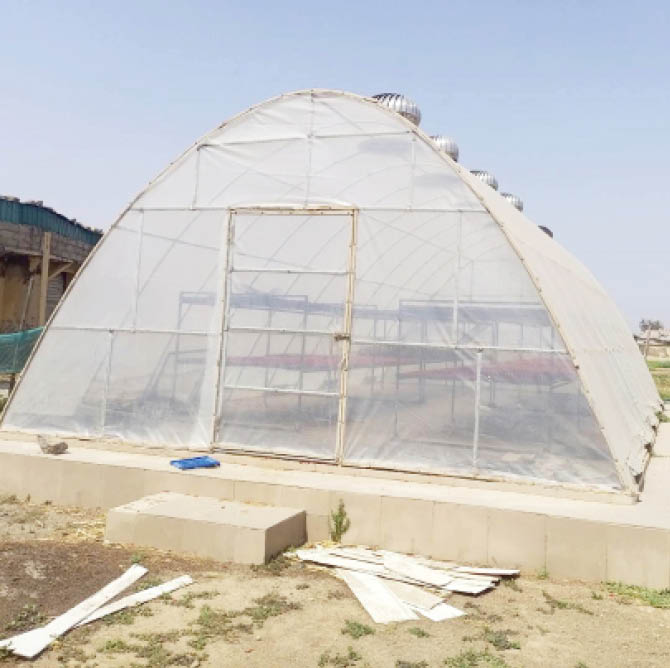Farmers equipped with post-harvest tech in Kano
It is apparent that farmers across the country have been suffering a lot due to issues related to post-harvest losses. It is also obvious that farmers lose a greater percentage of their harvest, especially perishables, due to poor preservation techniques, poor access to skills and presentation equipment. However, Kano Agropastoral Development Project (KSADP), funded by […]

Green house for vegetable preservation
It is apparent that farmers across the country have been suffering a lot due to issues related to post-harvest losses. It is also obvious that farmers lose a greater percentage of their harvest, especially perishables, due to poor preservation techniques, poor access to skills and presentation equipment.
However, Kano Agropastoral Development Project (KSADP), funded by the Islamic Development Bank (IsDB), Lives and Livelihood Funds (LLF) and the Kano State government, and implemented by Sasakawa Africa Association (SAA), has come up with measures to address the issue of post-harvest losses by training and empowering farmers on modern techniques to adopt in addressing the issues related to the issues.
One of the outstanding measures taken is the training and empowering vegetable farmers on adoption of vegetable tent dryer technology for drying and preservation of vegetables as a measure of post-harvest reduction. According to one of the vegetable farmer’s association leaders, Alhaji Sani Danladi Yadakwari, who is state chairman of Tomato Growers Association of Nigeria (TOGAN), vegetable farmers in Kano State, especially tomato farmers, have been facing serious losses, especially during the hay period of tomato harvest, adding that the introduction of the vegetable tent dryer system will surely reduce vegetable farmers’ plight.
He explained that it has become a perennial challenge that vegetable farmers have come to terms with, experiencing glut thereby making vegetable farming less attractive to many farmers. He added that the introduction of the tent dryer will bring to an end the sun-dry method initially adopted by farmers to preserve excess vegetables, especially tomatoes which he said was not done in a hygienic manner.
We can fuse tourism, culture, creativity to tell the world who we are – IBM Haruna
Fire guts Federal Secretariat, destroys Tinubu’s SA office
It was gathered that the project had established three of such tents located at vegetable producing sectors across the state.
Another system introduced by the project is the tomato processing and preservation techniques to women. Under the project, women were trained and empowered with the technical skills, as well as empowered with other input requirements to establish mini tomato procession outlets.
These trained women are encouraged to form groups that would be producing processed tomatoes that have been either preserved as paste or processed into tomato jams.
One of the beneficiaries of the intervention, Malama Zulaiha Bilyaminu Kura, of Rimin Bunu women farmers multi-purpose cooperative society, stated that women that were initially involved in sun-drying methods for others are now smiling to the banks as they have been elevated from working for others to working for themselves as a group of mini tomato processing hub.
Similarly, another initiative adopted and introduced to farmers is the aerated onion storage technology meant to reduce onion post-harvest loss and preservation. According to one of the state’s onion farmers Malam Bala Alo Shu’aibu, the newly introduced storage technology has the ability to reduce over 90 percent of onion post-harvest losses. It was, however, gathered that the project had established three aerated onion storage technology and 20 more are currently under construction.
Speaking on the project’s progress as implemented by SAA, Country Director of SAA Dr Godwin Atser stated that it is disheartening to learn that Nigeria as a nation has been losing about N3.5 trillion to post harvest loss, adding that Nigerian farmers could have been richer than they are had it been the issue of post-harvest is handled effectively.
According to him, SAA as an implementing partner in the KSADP has been promoting a robust agricultural transformation driven by increase in the adoption of mechanization in its aim to boost productivity as well as to reduce labour burdens.
He explained that the project has gone a long way in changing the narratives in the state agricultural activities, adding that more farmers have benefited from the intervention and a sizable increase in productivity has been recorded.
